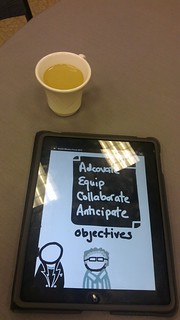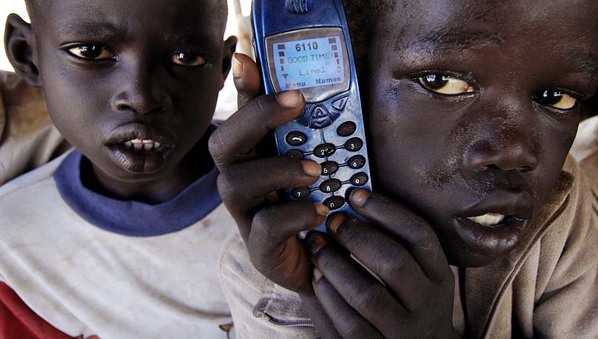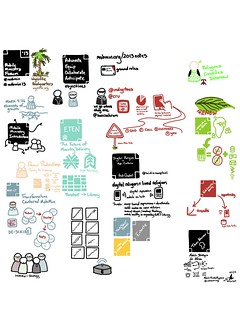Welcome to the second issue of Mobile Ministry Magazine (MMM) simply titled Envisioning. There was a decent response from the year’s first issue and so we are going to continue down the same path with this package of observations and insights from the mobile ministry (#mobmin) space.
Tag Archives: mobile in evangelism
2014 Issue 1: Making It Simple
Welcome to a refreshed Mobile Ministry Magazine (MMM). Starting this year, we are going back to the simplicity of the issue format. Each month we will be hitting on those points where you can discover, observe, relate, or be released into mobile ministry (#mobmin) efforts. It’s a packed issue, let’s get into it.
Mobile Ministry 2013 Notables

At the end of the calendar year, its customary to have all kinds of lists going about where you summarize important things, or make notes towards what should be coming in the new year. To a degree, we’ll keep with that – we’ve got some resolutions to report on – but I do want to note a few folks who came to mind as having some kind of neat positive and disruptive effect towards moving #mobmin forward this year. We’ll just note them by their Twitter handles:
- @jrgifford
- @tck2g
- @joelsam
- @brettq
- @heidiacampbell
- @renewoutreach
- @indigitous
- @issacharsummit
- @mobmin
Like with the Mobile Ministry Recommendations article, we’ll append this one as we think of a few more.
Updating Outreach Tools
Over the years, some of the conversations about mobile ministry have started (and sometimes stalled) at the outreach tools ministries and individuals use for their efforts. A common thing I’m seeing now is mobile apps for rich countries and DVDs/SD cards for poorer ones. Its interesting, and somewhat disheartening.
When you get out of the bubble of being immersed in mobile technologies and behaviors, you start to realize that mobile has a long way to go – mainly because there are methods that media organizations are used to, methods that audiences are used to, and a ground that’s transforming beneath them.
Questions asked to media ministries whom are looking at mobile, but already have distribution methods include things like:
- Is the content you currently producing/distributing able to be viewed on mobile devices
- What kinds of mobile devices are being used where you distribute that content
- Can your pre/post-production processes respond to mobile formatting and distribution
- What kinds of metrics does your org, its donors, etc. require
And then there’s just that simple basic thing of culture. Does the content you are bringing to that community already speak towards their culture, or is there some kind of teaching involved to make some of those points translate cleanly? If so, do those outreach tools actually work for outreach, or are they access points towards education (an in-reach activity)?
When someone hands me a DVD or CD today, I as them if they are more interested in getting their message to me than in me being able to use it? I should be asked if DVD/CD is a method that I’m apt to receive for this kind of material (am never asked that). If/when I respond if they have it available to share with me from their mobile and they say no – I have to ask again if they are more concerned with their message than in me receiving it.
When mobile comes into the picture, outreach tools have to not only reflect the intent of the message, but the ears of the audience.
Reflections on #mobmin13 Conference
Am still working through notes and such from the 2013 Mobile Ministry Forum Consultation, but while doing so, I wanted to jot down a few things which are still sticking out as points of reflection.
- For those who usually follow me, you know that I draw my notes during conferences, workshops, and Bible studies. I did the same here. Here’s the PDF (because you’ll want to zoom in for the really, really small stuff) and here’s the JPG – posted on Twitter and Google+ if you want to share too
- I actually was very surprised to see so much paper used during the conference. And then Clyde Taber pulled out using an Apple TV and his iPhone – from a happy-in-tech moment, that was one of the best (4 years ago, he gave me a blank look when I did stuff like that).
- Pay attention to Heidi Campbell’s work – some good data backing observations said here and other places; her upcoming study on digital religious creatives will be great
- Talked a bit about version 2 of the Mobile Ministry Methodology – even gave a preview of the analytic tool that will be launched alongside it. Guess who has more work to get done. See Version 1 of the Mobile Ministry Methodology
- Distribution using SD Cards is all the rage. Lots of folks wanting pure voice solutions though.
- The range of age was nice to see, and not like it was a few young and a lot of old; there was a lot of everyone (except women – conferences as a whole just need to be better on that end)
- If you get to meet Kent Shaffer – just listen. The Spirit of God rests on him. He was live-blogging the conference too (Preview, Recap 1, Recap 2)
- Each year, someone comes with a heavy bat of stats and info. This year it came twice: Faith Comes By Hearing and Tomi Ahonen – loved it
- Best quotes: “Information is not transformation” (John Edmonston of Cybermissions) and “Recharging and Redemption” (Tomi Ahonen)
- TWR 360, Ekko Mobile, Estante, Lightstream, C2C Story
- There were rumblings from some folks about how to pay more attention to the rise of the church in sub-Saharan Africa and SE Asia – I can imagine that next year, those folks will be represented well.
- I didn’t have the best of attitudes at the beginning of the conference, just kind of didn’t feel like hearing the same things (its been a long time in this space); by the time it ended, I changed – and got some timely and appropriate honesty from a few folks. I’m grateful for those in the Body who still pull us aside and let us know about ourselves.
That’s all for now. I’ll figure out something else in terms of reflections on another time. Check out the #mobmin13 and #mobmin hashtags on Twitter and other social media spaces for reflections from others. Or, go out there and experiment a bit.
Mobile, Privacy, and Considerations
Its easy to continue down the consumer line that the holiday brings – talking new devices, apps, and services, and leaving weighter concerns to the opt-ed pieces which might hit a magazine or two. And then there’s that sense of responsibility. A condition of mobile in ministry is to understand the landscape and the challenges of just being in this space. In light of what we do, own, or promote, it our responsibility to pay attention to what might negate this landscape as well.
…Thanks to smartphones or Google Glass, we can now be pinged whenever we are about to do something stupid, unhealthy, or unsound. We wouldn’t necessarily need to know why the action would be wrong: the system’s algorithms do the moral calculus on their own. Citizens take on the role of information machines that feed the techno-bureaucratic complex with our data. And why wouldn’t we, if we are promised slimmer waistlines, cleaner air, or longer (and safer) lives in return?
This logic of preëmption is not different from that of the NSA in its fight against terror: let’s prevent problems rather than deal with their consequences. Even if we tie the hands of the NSA—by some combination of better oversight, stricter rules on data access, or stronger and friendlier encryption technologies—the data hunger of other state institutions would remain. They will justify it. On issues like obesity or climate change—where the policy makers are quick to add that we are facing a ticking-bomb scenario—they will say a little deficit of democracy can go a long way…
That segment is from an article that’s stayed open in a tab for me for a number of weeks now. The Real Privacy Problem at MIT Technology Review is a must-read, must-bookmark, and must share.
And yet, that’s not the end of things. We understand that its not just what we do which is being exposed, but what others are gathering about our actions which present very real challenges – if not outright defining characteristics – to what it means to have mobile ministry practices.
…The NSA has no reason to suspect that the movements of the overwhelming majority of cellphone users would be relevant to national security. Rather, it collects locations in bulk because its most powerful analytic tools — known collectively as CO-TRAVELER — allow it to look for unknown associates of known intelligence targets by tracking people whose movements intersect.
Still, location data, especially when aggregated over time, are widely regarded among privacy advocates as uniquely sensitive. Sophisticated mathematical techniques enable NSA analysts to map cellphone owners’ relationships by correlating their patterns of movement over time with thousands or millions of other phone users who cross their paths. Cellphones broadcast their locations even when they are not being used to place a call or send a text message…
The Washington Post and others have been very brazen in publishing items like this. Whether or not one can get around that kind of monitoring is one thing, understanding what that monitoring means is another. And the truth also exposed here has to be understood – if countries are advanced enough to pursue these complicated and powerful means of using data to make connections, countries/governments/organizations/individuals which don’t have that skill, or have the controls in place that might be present legally/ethically here, not only have that ability, but have been working in similar manners.
Don’t just be so naive to dismiss the dangers when running towards the opportunities.
Don’t be so paralyzed by the dangers that you neglect running towards the opportunities.
CLA Mobile Ministry Course Registration Open
The Christian Leadership Alliance (CLA) has again opened the door to their winter session and the course we designed and will facilitate – Creating a Mobile Ministry: Mobile Ministry Introduction and Relevance – is going to be offered.
Learning Objectives
This course is designed to provide participants a better understanding of mobile technologies used in ministry practices. Upon completion, the participant should have a better understanding of the current information that is known in this space, be able to ask/answer questions of that information, and then generate new questions that will lead to sound research and applications of mobile technologies in ministry applications.
Module Overview
This course intends to lead the participant into an understanding of mobile technologies and behaviors which influence faith practices within Christian and other religious spaces, with the goal of creating a theological and sociological framework for analyzing, discussing, and leading local/global communities in mobile interactions. The participant will have the knowledge and foundational skills to supplement existing ministry activities, or start new ones which utilize mobile technologies, communications, and/or behaviors.
You can register for Creating a Mobile Ministry: Mobile Ministry Introduction and Relevance at the CLA website.
As with the previous offerings, if you have specific questions which are not answered on the course website, do ask.
November Videocast & Kolo Group Mobile App Video
Two videos this month to profile. The first is our monthly videocast, titled Mobile Experiences:
The second comes from the folks at the Kolo Group talking about the app and the mobile evangelism opportunity with it:
Check them out and if there are other videos we should be profiling, get in touch with us, or share via social networks so that we can promote those along with you.
Mobile-Led From the Wrong Voices

Another part of the package that makes mobile ministry an interesting topic is that of who is heard evangelizing what makes sense and what works well. In some respects, its easy to say that anyone who is doing anything with mobile can be an evangelist of its uses, but that’s not the case. The voices in leading mobile best come from those who are using it most directly (via Elezea).
…Now, a second question: when was the last time you heard that teachers in Africa are not trained properly, are demotivated and that the formal education systems in which they work are weak? My hunch is that you’ve heard much more about this than you’ve heard teachers praising mobile technology.
My concern is that some people use the problems with education systems to justify excluding teachers from the design and development of mobile learning interventions. Teachers’ voices are marginalised. And mobile operators association GSMA (to take just one example) characterises the teaching profession in a way that divorces it from progress and innovation.
The difficulties teachers face are used as a starting point for criticism, rather than as a motivation to address systemic issues…
That’s a hard win-lose. To see the prospects of mobile and then run to it feels like a success point, but then who is calling it a success? The person evangelizing it, or those putting it into practice?
How many of your mobile ministry efforts are founded in the context of the direct users? How many of those persons contribute directly to your project, and then to the local assimilation of mobile for that activity? Or, is this where your project hangs? Like we said in previous posts, do you understand the context of where you are asking for mobile to go?
[Infographic] Wired for Mobile Learning
Found this via the excellent TechPsych blog (via Voxy) – click on image to see it full sized:




